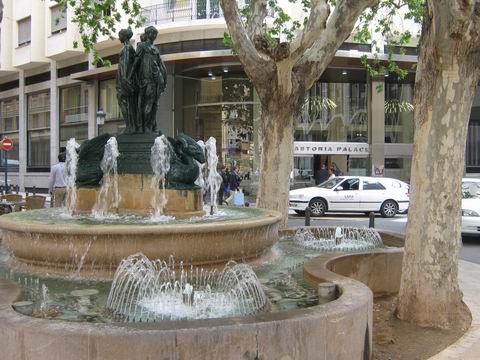It’s one of Valencia’s quaintest squares, and one that has appeared in at least two international films: The Curse of the Pink Panther and The Boy Who Stole a Million.
It’s also a lively place with restaurants with terraces and a pleasant fountain in the middle; not the sort of place that brings fossils to mind.
And yet Plaza Rodrigo Botet is named after Josep Rodrigo Botet, (1842-1915), the man responsible for the extensive collection of fossils in Valencia’s Museo de Ciencias Naturales in the Viveros Park.
 Many of the most important fossils come from South America, and they are unique in Europe, corresponding to the same series of two million year old extinct mammals that Charles Darwin discovered in Punta Alta, Argentina in 1833 during his famous voyage on the Beagle (the ship, not the dog). However, unlike Botet’s collection, Darwin’s specimens were bombed to oblivion by jealous Germans during World War II, which made Botet’s collection even more valuable.
Many of the most important fossils come from South America, and they are unique in Europe, corresponding to the same series of two million year old extinct mammals that Charles Darwin discovered in Punta Alta, Argentina in 1833 during his famous voyage on the Beagle (the ship, not the dog). However, unlike Botet’s collection, Darwin’s specimens were bombed to oblivion by jealous Germans during World War II, which made Botet’s collection even more valuable.
Botet was a potter’s son from Manises, born in 1842. The family moved to Valencia eight years later, opening a ceramic shop in the Plaza Redonda.
Josep however was a restless soul, who joined the Spanish army and was sent to Cuba
In 1864 he was accused of being a Carlista (one of those who supported Ferdinand VII’s brother Carlos for the throne rather than his daughter Isabel), and was expelled from the army. He was jailed in The Canary Islands and later in Valencia in a prison which is now a popular tourist attraction, the Torres de Quart.
At first he was exiled to France for his opinions, but later seems to have become a double agent, spying on his old comrades for the Crown.
The restoration of the monarchy didn’t help him much and he was accused of fraud and once again forced to flee to France, eventually deciding to try his luck on the American continent.
In Argentina he was employed as a civil engineer and participated in the planning of the cities of Buenos Aires and La Plata.
He travelled extensively, to the United States and Brazil, where he settled down with his third wife in
A friend of his, Enric de Carles, was a profesor who collected fossils and was about to sell his collection to a musuem in Copenhagen when Botet intervened and bought them, with the idea of taking them to Valencia as a way of facilitating his return from exile.
Botet spent a small fortune on his return, hiring a train from Barcelona to Valencia and organising a series of banquets to announce his arrival in August 1889.
He soon returned to Argentina leaving Carles to set up the exhibition, but he too abandoned the city after one of its regular outbreaks of cholera.
It wasn’t until 1908, that Eduard Boscà finally organised the collection in the Almudí, founding the Museo Paleontológico.
Botet meanwhile was living in Madrid, trying his hand at new businesses such as fruit and vegetable exports, soap and railways. None of his new ventures prospered however and he died a ruined man in 1915, although his fossils live on.
